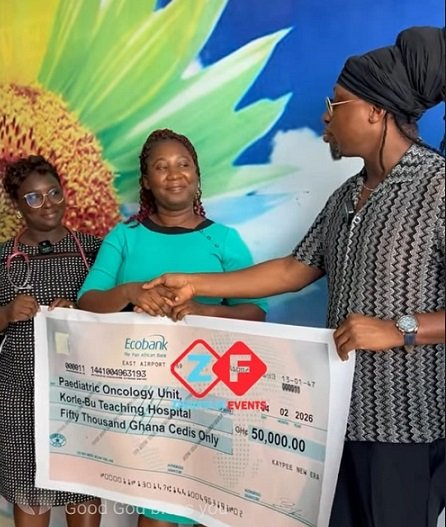News
Pojoba ‘85 hands over legacy project to alma mater

The 1985 year group of Pope John Senior High and Minor Seminary (Pojoba ‘85) Effiduase, Koforidua, has handed over their 40th anniversary project to the school at the weekend.
The project, which cost over Gh¢600,000.00, comprises of renovation and re-roofing of parts of the kitchen, construction of two brand new modern washroom with showers, and toilet facilities for both male and female kitchen staff, resurface the kitchen compound, the scullery, drains and gutters.
They also provided a place for cleaning and washing of vegetables, an office complex for the matrons, two big store rooms fixed with cabinets for storage of food stuffs, staff changing rooms, among others.
A member of the ‘85 year project committee, Mr G. Eddie Yawson, drew the attention of the students to maintain the facility for posterity.
The Eastern Regional Chairman of Pojoba, Dr Albert Cole, urged the students to let the spirit of the school pass through them before they enter the world.
The National President of Pojoba, Mr Isaac Aboagye Duah, talked about the projects other year groups were embarking upon and urged the students to remain steadfast in their dealing and respect their teachers.
A former national President, Mr Kwame Djamgba, cut the tape to hand over the project which was blessed by the Headmaster, Rev. Fr. Benjamin Ohene, and called on the other year groups to come on board quickly.
Join our WhatsApp Channel now!
https://whatsapp.com/channel/0029VbBElzjInlqHhl1aTU27

By Linda Abrefi Wadie
Entertainment
Kwaisey Pee honours promise, donates GHC50,000 to Korle-Bu Paediatric Oncology Unit

Ghanaian music icon, Akwasi Poku Addae, known in Showbiz circles as Kwaisey Pee has honoured his promise to children suffering from cancer.
Ahead of his 25th anniversary event held at the D’ Icon Event Centre at East Legon last year, he made a promise to donate some funds to children suffering from cancer.
True to his word, the musician has recently made a donation of GHC50,000 to the Paediatric Oncology Unit of the Korle-Bu Teaching Hospital.
He told the Ghanaian Times that children are so dear to him, and was optimistic the support would go a long way too impact lives.
The music dynamo also promised that the gesture will not be the last,” it will be a continuous feature from me.”
He also called on Ghanaians home and abroad to lend a helping hand to children suffering from cancer.
According to him, children with cancer have many needs, and a helping hands will go a long way ease the suffering.
“Cancer treatment is very expensive, and leaving that to parents of the children alone, will be a huge burden, with support from you and myself, we can make some changes in other people’s lives,” he concluded.
By Edem Mensah-Tsotorme
News
Dickson Kyere Duah, Kwadwo Poku clash over government funding for World Cup participation

A disagreement has emerged between Member of Parliament for Berekum West, Dickson Kyere-Duah, and energy consultant Kwadwo Poku over government funding for Ghana’s participation in the 2026 FIFA World Cup.
The debate centred on government’s decision to budget about 13 million dollars to support the national team, even though FIFA is expected to provide an appearance fee of about 10.5 million dollars if Ghana qualifies for the tournament.
During the discussion on Joys news , Mr Poku questioned why the government should allocate such an amount when FIFA already provides funds to participating countries.
According to him, the appearance fee alone should help cover some of the country’s expenses.
He argued that if FIFA is giving Ghana 10.5 million dollars simply for qualifying for the tournament, it raises questions about the need for the government to appropriate additional funds.
Mr Kyere Duah, however, explained that the government’s allocation was part of advance planning captured in the national budget even before the final qualification results were known.
He noted that the budget for the tournament period was prepared in November 2025, when it was not certain that Ghana would qualify.
He stressed that budgeting does not automatically mean the entire amount will be spent.
According to him, the funds are meant to prepare the team from the start of the competition period until the end of the tournament.
Mr Kyere Duah explained that if the team exits the tournament early, the full amount allocated in the budget will not be used.
Mr Poku maintained that FIFA already provides financial support to teams for participating in the World Cup and insisted that the government must clearly justify additional spending.
The discussion extended to the role of the Ghana Football Association in managing the national teams.
Mr Poku described the association as a private institution and argued that FIFA also operates as a private body that does not allow government interference.
He explained that FIFA provides funds to teams to support their preparation and participation in the tournament.
Mr Kyere Duah, however, maintained that national teams represent the country and require government support to operate effectively.
By: Jacob Aggrey

 News1 week ago
News1 week agoFinance Minister outlines new gold policies to boost reserves and curb smuggling

 News1 week ago
News1 week agoSam George launches the 2026 Meteorological Awareness Month; presents the 2026 seasonal forecast for southern Ghana

 Hot!1 week ago
Hot!1 week agoBreaking: Footballer who killed two children in Abesim handed lifetime sentence






